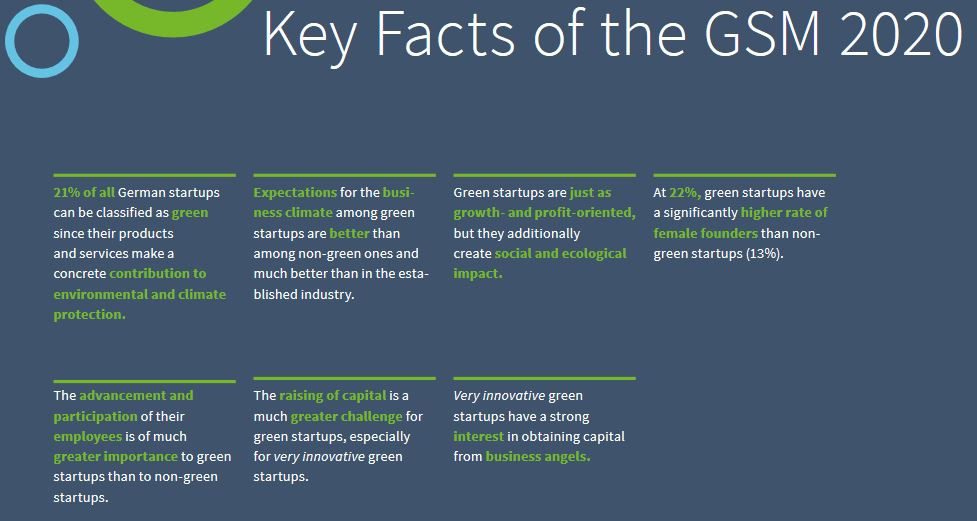Govt must support green start-ups to "strengthen economic immunity" - report
The German government must provide urgent support to the country's green start-ups to safeguard an important engine for a sustainable economic recovery, a study on the sector says. The young companies are key to rebuilding a more resilient economy, but cannot fulfil their potential as many lack suitable capital and are hampered by an absence of targeted government support, argues the Green Startup Monitor by the Borderstep Institute and the German Startups Association, the most detailed yearly survey of Germany's green start-up scene.
"The current crisis could improve the long-term prospects for green start-ups," said Borderstep founder Klaus Fichter with reference to yesterday's support by Chancellor Angela Merkel for rebuilding a more climate-friendly economy in the wake of the coronavirus crisis. "But it's crucial that the companies survive the coming months. We must not lose our beacons of hope in the short term."
Germany has been dubbed "Green Energy Valley" due to its innovative batch of green energy start-ups. In sectors such as storage and hydrogen, German start-ups are among the world's leaders, and could be key to cleaning up polluting industries. As the energy transition is turning Germany's economy inside out, many start-ups are taking advantage of the transformation by bringing novel business ideas to market, and by snatching market share from incumbent in sectors such as renewables, heating, and mobility.
The start-up scene could benefit from the fact that the idea of a green recovery is quickly gaining ground in Germany and beyond. Top politicians from Germany and more than 60 large companies have warned that the climate crisis must continue to be a top priority, even as the world economies grapple with the impact of the coronavirus pandemic. Ministers from 30 countries debated possibilities of a green recovery at the 11th Petersberg Climate Conference earlier this week.
Start-ups are eating into savings to survive crisis
"Green start-ups strengthen the economy's immunity, because they work on solving the largest challenges our society faces," Fichter said, adding the companies provided a "double dividend" because they boost the economy and protect the environment at the same time.
"Policy is missing out on the growth potential of green start-ups," Fichter said. "Politicians find green start-ups nice and beautiful, but that's not enough. We need concrete policies. There are around 6,000 green start-ups in Germany, they are an important economic factor and create thousands of jobs."
More than 80 percent of German start-ups need to dip into their savings to weather the crisis, said Christian Miele, president of the start-up association. "The crisis offers a huge opportunity to create a more sustainable economy, both in Germany and Europe. But policy support is needed here."
Because many start-ups grapple with high entry barriers to many markets, the report calls for a financing programme specifically geared towards sustainability, and policy support for the establishment of regional "sustainability hubs" to improve cooperation between start-ups, established small and medium-sized companies, and other actors in the start-up ecosystem. Highly innovative green start-ups in particular report high barriers to accessing capital.
Fichter said this is because many investors lack experience with green start-ups, partly because they are not used to financing companies that often work in tightly regulated markets, such as energy.
The energy transition’s spread into transport, industry and heating, as well as the challenges of integrating a rapidly rising share of renewable electricity in many countries around the globe, underscores the importance of innovation to make the switch to clean energy work. Countless new solutions are required to decarbonise all sectors of the economy, and in many cases it is start-ups that can provide them.
The speed of energy transition innovations, often led by start-ups, continues to exceed expectations – witness the dramatic cost reductions in PV solar and battery storage, which have sparked rapid solar growth around the globe. According to Germany’s environment ministry, around two-thirds of all “green” basic innovations can be traced back to companies established by founders.
Motor for structural change
"Green start-ups have a key function as a motor for structural change," the report says. "While established companies are strong in improving existing products, it is start-ups that are pioneers in bringing fundamental environmental innovations to market."
The report says that 21 percent of all young and innovative German companies can be classified as "green" since their products and services make a concrete contribution to protecting the environment.
"Start-ups are important drivers of innovations, which are key if we want to master the current challenges," economy minister Peter Altmaier wrote in a preface to the Green Startup Monitor.
"Governments, don't let your start-ups die"
German companies are not alone in fearing for their survival during the current economic crisis. "Policy makers leading advanced startup ecosystems around the globe have spent far too much time and invested far too many resources to watch the COVID-19 crisis wash it all away. To avoid this fate, an aggressive emergency policy response is required," according to US researchers Startup Genome.
The researchers say the current crisis might well prove to be more severe than the global financial crisis, when US venture capital investment deals dropped between 30 and almost 50 percent from 2008 to 2009.
Startup Genome also argues that start-ups are key to rebuilding the economy. "In the wake of the last crisis, startups contributed strongly to the economic recovery," the organisation writes in its latest report on the coronavirus impact on start-ups, entitled: "Governments, Don't let your start-ups and scale-ups die".



